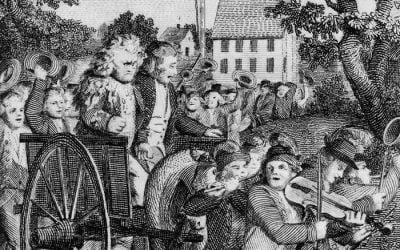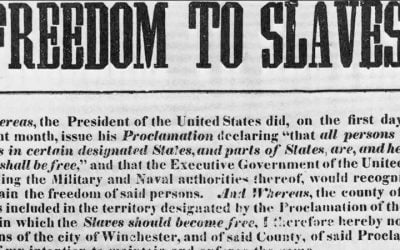By William H. Benson
The Parallel Lives
Of The NOBLE AMERICAN RELIGIOUS THINKERS AND BELIEVERS:
Roger Williams VS. Cotton Mathers
NEW ARTICLES
Gettysburg and Memorial Day
On June 28, 1863, Robert E. Lee, Confederate General, dared to cross the border and invade Pennsylvania, a Union state. Lee hoped to force Lincoln into negotiations to end the war.
Lincoln felt dismayed. He understood that Union troops must repel Lee’s advance.
On the 1st, 2nd, and 3rd of July, a horrific battle unfolded, involving tens of thousands of troops that fought, clawed, and struggled at Gettysburg, Pennsylvania. Neither side defeated the other, but Union troops withstood Pickett’s charge up to Cemetery Ridge on the last day.
Lee was forced to withdraw, to head south. For a week after, Lincoln urged the Union General, George Meade, to attack Lee a fourth day, who was trapped because of a flooded Potomac River, but because Meade refused, the war drug on for almost two more years.
What to do with the dead? The historian Garry Wills wrote in his account, “Lincoln at Gettysburg: The Words That Remade America,” “Gettysburg, a town of only 2,500 inhabitants, was one make-shift burial ground, fetid and steaming.”
At least 5000 dead and rotting horses and mules lay in and around the town, plus 7058 dead human beings: 3155 Union soldiers and 3903 Confederate soldiers.
Fire consumed the horses, but the dead soldiers were covered with a thin blanket of earth. Upright boards standing beside each mound identified the names of each Union body.
A prominent Gettysburg resident named David Wills formed an interstate commission to collect funds to purchase seventeen acres of land near Gettysburg for a cemetery, to find and hire an architect to design a cemetery there, and to hire a team to rebury the dead into that cemetery.
Wills hired an architect named William Saunders, who designed a cemetery composed of a series of semicircles that ascended an incline, so that each plot was neither greater or lesser in value to any other plot. The work of reburying the dead into that new cemetery began.
By the fall of 1863, officials of the interstate commission began to form plans for a dedication ceremony. Wills extended offers to others, but it was the renowned orator Edward Everett who agreed to speak. President Abraham Lincoln agreed to say a few Dedicatory Remarks.
On Thursday, November 19, 1863, Edward Everett spoke for two hours, Lincoln for two minutes. Lincoln said only 272 words, divided into ten sentences and three paragraphs.
The seventh sentence resonates still today. “The world will little note nor long remember what we say here, but it can never forget what they did here.”
Consider how Lincoln contrasted two words, “say” and “did.” He and his fellow officials can “say” a massive number of words at a dedication ceremony, but it is what the Northern soldiers “did” that is of greater importance. They “gave their lives that that nation might live.”
Consider also in that sentence how Lincoln introduces memory into his text, when he contrasts the word “remember” to “forget.”
The word “note” refers to jotting words onto paper, so as to not forget, but to remember.
Lincoln concluded his Remarks. “[W]e here highly resolve that the dead shall, under God, have a new birth of freedom, and that the government of the people, by the people, and for the people shall not perish from the earth.”
Memorial Day approaches. We cannot forget. We remember. We have our notes. We reflect upon our hard-fought-for freedoms that Lincoln insisted “shall not perish from the earth.”
Milton Hershey School
Earlier this month, a New York Times reporter named Andrea Elliott published a book, Invisible Child: Poverty, Survival and Hope in an American City.
In the book, Andrea delves into the life of a family: Chanel, the mother; Supreme, her husband; and her seven children. In 2012, the family resided in a single room in the Auburn Family Residence, in Brooklyn, New York.
Andrea started her investigative reporting on the city’s poor and destitute by drifting around the Auburn’s front door. In October of 2012, she met Chanel, whose seven children would follow her out the building and down the sidewalk. The family soon let Andrea into their home, via the fire escape.
Tuskegee University
Tuskegee UniversityTuskegee University is a “private, historically black, land-grant university” in east central Alabama, with an endowment of $129 million, as of 2019. That same year 2,876 students were enrolled, and of those, 2,379 were black. Of the 560 degrees...
Smallpox
Called “the most dreadful scourge of the human species,” smallpox begins with fever, muscle pain, headache, and fatigue. Days later lesions will appear first inside the mouth and on the tongue, and later, lesions will attack the skin on forehead, face, trunk, and arms.
The Road to 9-11
During the 1990’s, the Clinton administration received sufficient warnings that Osama bin Laden’s terrorist organization, al-Qaeda, intended to continue to carry out attacks upon U. S. citizens and their property, by enlisting suicide bombers.
Afghanistan
The United States will depart Afghanistan on Aug. 31, after almost 20 years of nation-building, the most recent foreign power to surrender that harsh, cold, Himalayan terrain, “the graveyard of empires,” back to the Afghan people.
The British tried three times to tame the poor but fierce Afghan fighters. In the first Afghan War, 1839-1840,
Euclid’s Elements
The Greek mathematician Euclid, who wrote Elements of Geometry, “the most successful textbook of all time,” around 300 BCE, in Alexandria, in Egypt, in northern Africa. Lincoln though took to heart Euclid’s talent for making sense out of the bewildering. Euclid started with 35 definitions, a handful of postulates, a dozen or more axioms, a series of postulates, and argued for a set of theorems, all about triangles, lines, angles, squares, and circles.
Older Posts
Plagues
Rarely do men and women seem free, even for a moment, from the evils that have plagued human beings for millennium: war, poverty, famine, slavery, racism, diseases, pestilence, and natural disasters.
The U.S. armed forces first attacked the Taliban in Afghanistan on October 7, 2001, and now, the twin wars in Afghanistan and Iraq are winding down after two decades, wars that have cut short many human lives and caused painful, debilitating injuries. On the horizon is a menacing conflict with China.
Iceland
In recent days a native Icelander named Egill Bjarnason published a book, “How Iceland Changed the World.” I wonder about that title’s bold claim, but nonetheless he writes well, is entertaining.
He begins with the Vikings, and then steps forward, chapter by chapter, until he finishes in the 21st century. Along the way, he brings in plenty of fascinating details about the island’s towns, people, weather, government, and the Northern Lights, an enjoyable and readable geography primer.
Patriot vs. Loyalist
As the year 1776 unfolded, American colonists were confronted with the question of independence. Some favored it, others rejected it, and a third group remained uncommitted.
Juneteenth
You and I, and all others who claim American citizenship, now have reason to celebrate a new Federal holiday, Juneteenth, our 12th legal public holiday.
Last week, on Tuesday, June 15, the Senate unanimously passed legislation to make June 19, or Juneteenth, a national holiday. On Wednesday, June 16, the House passed it with only 14 “no” votes.
On Thursday, June 17, President Joe Biden signed into law the Juneteenth National Independence Day Act in the White House’s East Room.
Equations
How does one recognize great writing in a novel, a work of history, or a scientific treatise? The typical answers include: if it sells 5,000 copies, if it makes the “New York Times Best Seller” list, if it wins a literary prize, if a literary critic gives his or her stamp of approval, or if it is printed for decades.
Tulsa Race Riot Marks Its Centennial
Here are some thoughts on the 1921 Tulsa race riot.The 1921 race riot in Tulsa began on Monday, May 30, Memorial Day, when a young black man stepped into an elevator, tripped, and either grabbed a young white girl’s arm to steady himself, or stepped on her foot. She...

One of University of Northern Colorado’s 2020 Honored Alumni
William H. Benson
Local has provided scholarships for history students for 15 years
A Sterling resident is among five alumni selected to be recognized this year by the University of Northern Colorado. Bill Benson is one of college’s 2020 Honored Alumni.
Each year UNC honors alumni in recognition for their outstanding contributions to the college, their profession and their community. This year’s honorees were to be recognized at an awards ceremony on March 27, but due to the COVID-19 outbreak that event has been cancelled. Instead UNC will recognize the honorees in the fall during homecoming Oct. 10 and 11……
Newspaper Columns
The Duodecimal System
For centuries, the ancient Romans calculated sums with their clunky numerals: I, V, X, L, C, D, and M; or one, five, ten, 50, 100, 500, and 1,000. They knew nothing better.
The Thirteenth Amendment
On Jan. 1, 1863, President Abraham Lincoln signed the Emancipation Proclamation, and by it, he declared that “all persons held as slaves” within the rebellious states “are and henceforward shall be free.” Lincoln’s Proclamation freed some 3.1 million slaves within the Confederacy.
The Fourteenth Amendment
After Congress and enough states ratified the thirteenth amendment that terminated slavery, Congress passed the Civil Rights Act of 1866. This law declared that “all people born in the United States are entitled to be citizens, without regard to race, color, or previous condition of slavery or involuntary servitude.” The Act equated birth to citizenship.
The New-York Packet and the Constitution
Jill Lepore, the Harvard historian, published her newest book a month ago, These Truths: A History of the United States. In a short introduction, she describes in detail the Oct. 30, 1787 edition of a semi-weekly newspaper, The New-York Packet.
Mr. Benson’s writings on the U.S. Constitution are a great addition to the South Platte Sentinel. Its inspiring to see the history of the highest laws of this country passed on to others.
– Richard Hogan
Mr. Benson, I cannot thank you enough for this scholarship. As a first-generation college student, the prospect of finding a way to afford college is a very daunting one. Thanks to your generous donation, my dream of attending UNC and continuing my success here is far more achievable
– Cedric Sage Nixon
Donec bibendum tortor non vestibulum dapibus. Cras id tempor risus. Curabitur eu dui pellentesque, pharetra purus viverra.
– Extra Times
FUTURE BOOKS
- Thomas Paine vs. George Whitefield
- Ralph Waldo Emerson vs. Joseph Smith
- William James vs. Mary Baker Eddy
- Mark Twain vs. Billy Graham
- Henry Louis Mencken vs. Jim Bakker












